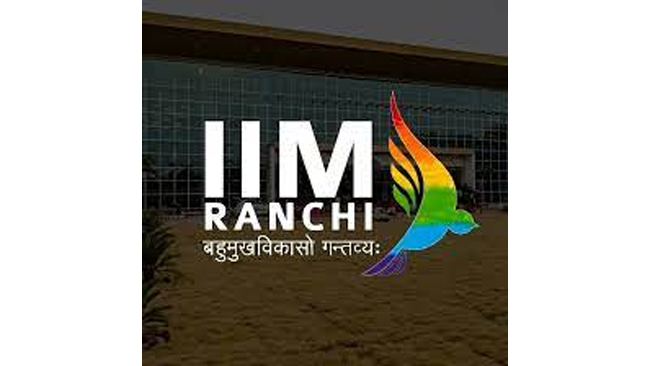
New Delhi,
August 01, 2023.
Demonstrating its
commitment towards sustainable socio-economic development and to fostering positive
transformation in tribal communities, National Skill Development Corporation
(NSDC), the strategic implementation and knowledge partner for Skill India
Mission,and Indian Institute of Management Ranchi (IIM-R) have collaborated to
introduce livelihood opportunities for janjati regions through skill-based
interventions within respective geographies and promote their holistic
development at the grassroot level.
This unique internship programme is designed to
provide relevant exposure to 80 interns from IIM Ranchi around social projects
by making them an integral part of planning and strategy development efforts of Singi Dai Van Vigyan
Kendra, a multiskill development center. The focus of the programme ison
key segments such as medicinal
plants, horticulture, and aromatic essential oil segments in tune with the
local resources and culture. As part of the initiative, the second-year
students from the Integrated Programme in Management (IPM), IIM Ranchi
completed their five-day visit at Vikas Bharti,Bishunpur, Jharkhand which provided thorough insights on
rural development initiatives and ponder, tinker on innovative solutions to
promote sustainability,benefiting the locals.
Vikas Bharti Bishunpur, a civil society
organization with 40 years of experience in empowering Janjati communities,
will be the implementation partner in this project. Also present was Padmashri
Ashok Bhagat ji, who addressed the audience with insights into this
innovative approach. He mentioned that this opportunity was an eye opener for
students and enabled them to sync with their community and find solutions for
their livelihoods.
Their cutting-edge approach, out of the box
thinking resonated in the solutions they brought. Through an integrative
approach, NSDC and Ministry of Skill Development & Entrepreneurship are
helping ground organizations work with IIM and industry experts.
To
cement and formalize the programme, the students from IIM Ranchi divided
themselves as three enterprises and worked on marketing plans that provided
strategies for better agricultural production and community engagement. The
one-month internship programme has successfully trained interns across the nine batches,consisting of three
groups each from three verticals which worked together on one enterprise.
Speaking
on the occasion, Shri Ved Mani Tiwari, CEO, NSDC and MD, NSDC International
said, fostering entrepreneurship opportunities in agriculture, medicinal
plants and aromatic oils is a crucial step towards empowering the tribal communities
and fine-tuning their skills in niche areas. Through our cooperative efforts,
we aim to provide skill
upgradation, robust training, and the necessary toolkit to the students of IIM
Ranchi, extending the mentoring support to India’s tribal communities. This
collective effort is aligned with our vision of empowering communities by
generating sustainable income. Through
this collaboration between NSDC, IIM Ranchi and
Vikas Bharti, we will not only establish strong relationships with local
governments, NGOs and industry stakeholders but also build market linkages and
industry connect for the locals.
The plans submitted by each of the
groups have showcased innovative strategies which we will in fact adapt in the
programme to serve the tribal communities. I congratulate the students for
coming up with their spectacular ideas and progressive approaches.He added.
Prof Deepak Kumar Srivastava, Director IIM Ranchihighlighted the
scope and importance of tribal entrepreneurship in Jharkhand.Guided by its
strategic plan IIM Ranchi@2030, Indian Institute of Management (IIM) Ranchi is
aiming to become a globally renowned institute which deeply connected with the
local community. IIM Ranchi intends to undertake research on tribal
entrepreneurship to create a real-world impact on the domain of tribal
enterprises in India and bring the scope of the tribal economy to the fore of
academic and policy discussions. Therefore, the research on tribal
entrepreneurship will represent a comprehensive picture of the enterprises
owned by the tribes in tribal areas, which incorporate both social and profit-making
enterprises. The research will focus on the evolution of enterprises, success
stories of community-based enterprises, exploration of the keys of success and
replication, optimization of minor forest products for creating new
enterprises, tribal skill development, issues and opportunities in the tribal
areas, and socio-economic development of tribes in India.
The initiative also
serves as an opportunity for students to fine-tune their basics and
fundamentals on rural marketing, cooperative societies, and mutually aided self-help
groups under the guidance of faculty members and experts of IIM, enabling them
to mark a significant impact on increasing demand for local products in
national and international markets. On the completion of the project, students worked
on the industry-market linkage plan and the best pitching plan will get implemented in NSDC funded Multi Skill
Development cum Women Empowerment centre at Balatu.
Based on the findings, each group submitted
thorough report on the viable and sustainable
business models aimed at assisting farmers in establishing market
linkages, expanding distribution network, and developing robust supply value
chains.
The first report sheds light on the challenges
faced by thetribal farmers in the region, including limited bargaining power and inadequate connections to the market. And
for overcoming these challenges, the report suggeststhe establishment of a
cooperative-based Farmer Producer Organization (FPO) that enables farmers to
fetch higher prices for their Shatavari supply compared to individual
negotiations, enhancing their collective bargaining power and economic
prospects. The second report highlights the potential of producing and
marketing lemongrass and citronella oil while leveraging the Self-Help Groups
(SHGs) model. The approach aims to foster self-efficiency, enhance product quality,
and reduce the influence of intermediaries. The third report underscores the
significance of cultivating the Palmarosa (Cymbopogonmartinii)
plant for uplifting the local communities as it has numerous therapeutic and
healing properties and large yield.
Furthermore,
the students mapped various schemes of Government of India on agriculture, horticulture, andforest produce such
asAYUSH, NABARD, SIDBI, Medicinal plant promotion board for enhancing community
engagement, inclusive growth and building capacities of the region.